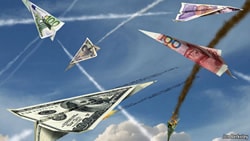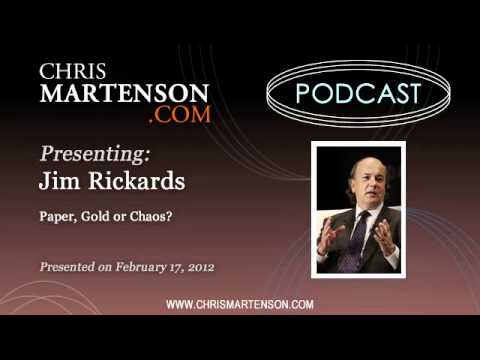 History is replete with the carcasses of failed currencies destroyed through misguided intentional debasement by governments looking for an easy escape from piling up too much debt. James Rickards, author of the recent bestseller Currency Wars: The Making of the Next Global Crisis, sees history repeating itself today – and warns that we are in the escalating stage of a global currency war of the grandest scale.
History is replete with the carcasses of failed currencies destroyed through misguided intentional debasement by governments looking for an easy escape from piling up too much debt. James Rickards, author of the recent bestseller Currency Wars: The Making of the Next Global Crisis, sees history repeating itself today – and warns that we are in the escalating stage of a global currency war of the grandest scale.
Whether it ends in hyperinflation, in the return to some form of gold standard, or in chaos, history is telling us we can have confidence that it will end painfully.
On the Cause of Currency Wars
A currency war in the simplest form is basically when there is too much debt and not enough growth. The overhang of debt impedes growth because it clogs up bank balance sheets and clogs up the savings to investment mechanism and has a lot of negative effects. So there is not enough growth to go around. So countries, in effect, try to steal growth from their trading partners by cheapening the currencies.And indeed, the Fed and the Treasury are trying to do that right now. They are trying to cheapen the dollar, probably for the reason I mentioned. The problem is it does not stop at that. It invites retaliation...A couple things happen. Number one – we cheapen our currency but other countries try to cheapen their currency also, so you get into these tit-for-tat devaluations where nobody wins. All you do is unleash inflation, restrict world trade without anyone getting an advantage. I like to say that in the currency wars, all advantage is temporary. You give it up pretty quickly.The other thing is that for countries that cannot necessarily devalue, they can use capital controls, they can use import excise taxes. Currency wars can turn into trade wars. Ultimately, they can even turn into shooting wars. So you get all these bad effects.
So if the U.S. could cheapen the dollar in isolation, if nothing else happened, maybe there would be some quick advantage. But that is not what happens. But it is a temptation that politicians and policymakers can not resist, but it ends very badly.
On Current U.S. Monetary Policy
There is no question. It is quite clear that the Treasury and the Fed are trying to inflate their way out of the problem and debase the dollar.
The problem I see is they might not get there, and here is why. The Fed thinks they are playing with a thermostat. You know, you can, if the room is too cold you dial it up. If the room is too hot, you dial it down by adjusting the money supply and working a little bit with expectations on the behavioral side that can gradually tweak economic behavior and lending and spending velocity and money supply that achieve a desired result. The problem is they are actually playing with a nuclear reactor. They are playing with a complex system that is in or near the critical state. Now, you can dial a nuclear reactor up and down but if you don't get it right, the consequences are worse than having to put on a sweater. The consequences are catastrophic. You can melt down a reactor and ultimately, the entire financial world.
So the danger I see is the Fed thinks they are playing with a thermostat. They are playing with a nuclear reactor and they risk collapsing the entire system.
On the Importance of Understanding What's Happening
So that is what the Fed is trying to do. They are trying to get that lending/spending machine going again, get the velocity of money up and kind of inflate their way out of this problem.
A couple problems with that. Number one, two percent inflation is not so benign. Two percent inflation cuts the value of the dollar by seventy five percent in the course of a typical lifetime. So it cuts it in half in thirty-five years and then in the following thirty-five years, cuts it in half again. So now, you are down seventy five percent from where you started. So from the time you are born to the time you die, your dollar is going to lose seventy-five percent of its value. That is at two percent inflation. At four percent inflation, it will cut the value of a dollar in half by the time your children go to college. So these are cancerous rates of inflation. Two percent sounds warm and fuzzy. It is not.
The other thing economists say is, you know, who worries about inflation because your wages are going up and it all comes out in the wash. Well, I mean, this is the kind of thing that only an economist could say. But the fact is some of it does come out in the wash on average. But we do not live on average. We live our individual experiences.
And the fact is in inflation, there are winners and there are losers. The winners are people who can see it coming, who understand what you and I and hopefully the listeners are talking about and hedge their position by getting gold or silver or land or fine art or investing in railroads as Warren Buffett is doing, some kind of hard asset play. The losers, those are savers, people with insurance policies, annuities, pensions, retirement plans – anything denominated in dollars that are not going to go up when the inflation kicks in.
This interview is so insight-packed that I had trouble winnowing down the quotes to highlight. It is a 'must-listen' for those concerned about preserving the purchasing power of their wealth.
Click the play button below to listen to Chris' interview with James Rickards (runtime 29m:25s):
iTunes: Play/Download/Subscribe to the Podcast
Download/Play the Podcast (mp3)
Report a Problem Playing the Podcast
Or click here to read the full transcript.
James Rickards is the author of Currency Wars: The Making of the Next Global Crisis, published by Penguin/Portfolio, November 2011.
He is Senior Managing Director at Tangent Capital Partners LLC, a merchant bank based in New York City, and is Senior Managing Director for Market Intelligence at Omnis, Inc., a technical, professional, and scientific consulting firm located in McLean, VA. Mr. Rickards is a seasoned counselor, investment banker and risk manager with over thirty years' experience in capital markets, including all aspects of portfolio management, risk management, product structure, financing, regulation, and operations. Mr. Rickards' market experience is focused in alternative investing and derivatives in global markets. He has also served as General Counsel at several alternative asset management companies and a stock exchange facility and is expert in fund governance and international fund structures.
Mr. Rickards' career spans the period since 1976 during which he was a first hand participant in the formation and growth of globalized capital markets and complex derivative trading strategies. He has held senior executive positions at sell side firms (Citibank and RBS Greenwich Capital Markets) and buy side firms (Long-Term Capital Management and Caxton Associates) as well as technology firms (OptiMark Technologies and Omnis). Mr. Rickards has been a direct participant in many of the most significant financial events in recent decades including the release of US hostages in Iran in 1981 and the LTCM hedge fund collapse of 1998 in which Mr. Rickards was the principal negotiator of the government-sponsored rescue. He was involved in the formation and successful launch of several hedge funds and fund-of-funds. His advisory clients include private investment funds, investment banks, litigation counsel, high-net worth individuals and government directorates. Since 2001, Mr. Rickards has applied his financial expertise to a variety of tasks for the benefit of the U.S. national security community and the Department of Defense. Mr. Rickards is licensed to practice law in New York and New Jersey and various Federal Courts and has held all major financial industry licenses.
Mr. Rickards has been a frequent speaker at conferences sponsored by bar associations and industry groups in the fields of derivatives, the international monetary system and hedge funds and is active in the International Bar Association. He has been the interviewed in The Wall Street Journal and on CNBC, Fox, CNN, NPR and C-SPAN and is an OpEd contributor to the Financial Times, New York Times and the Washington Post.
Mr. Rickards is a graduate school visiting lecturer in finance at Northwestern University, the School of Advanced International Studies and Singularity University. He has delivered papers on econophysics at the Applied Physics Laboratory, the Los Alamos National Laboratory and the NASA Ames Research Center. Mr. Rickards has written articles published in academic and professional journals in the fields of strategic studies, cognitive diversity, network science and risk management. He is an advisor to the Committee on Foreign Investment in the United States (CFIUS) Support Group of the Director of National Intelligence.
Mr. Rickards holds the following degrees: LL.M. (Taxation) from the New York University School of Law, New York City; J.D. from the University of Pennsylvania Law School, Philadelphia; M.A. in international economics from the Paul H. Nitze School of Advanced International Studies, Washington DC; and a B.A. degree with honors from the Krieger School of Arts & Sciences of The Johns Hopkins University, Baltimore.
Our series of podcast interviews with notable minds includes:
- Chris Martenson (answers your questions)
- Charles Eisenstein
- James Dines
- John Mauldin
- Jack Keller
- Rick Rule
- Robert Rapier
- Gordon Chang
- Turd Ferguson
- Eric Janszen
- Paul Brodsky
- Carolyn Baker
- David Stockman
- Rob Hopkins
- Joel Salatin
- Charles Hugh Smith
- Frank Barbera
- Nate Hagens
- David Morgan
- James Turk
- Eric Sprott
- John Rubino
- Addison Wiggin
- Simon Black
- Axel Merk
- Paul Tustain
- Francis Koster
- Dogs_In_A_Pile
- Bud Conrad
- John Williams
- Robert McFarlane
- David Collum
- Joe Saluzzi
- Jim Rogers
- Bill Fleckenstein
- Marc Faber
- Willet Kempton
- Dan Ariely
- Ted Butler
This is a companion discussion topic for the original entry at https://peakprosperity.com/james-rickards-paper-gold-or-chaos-2/
